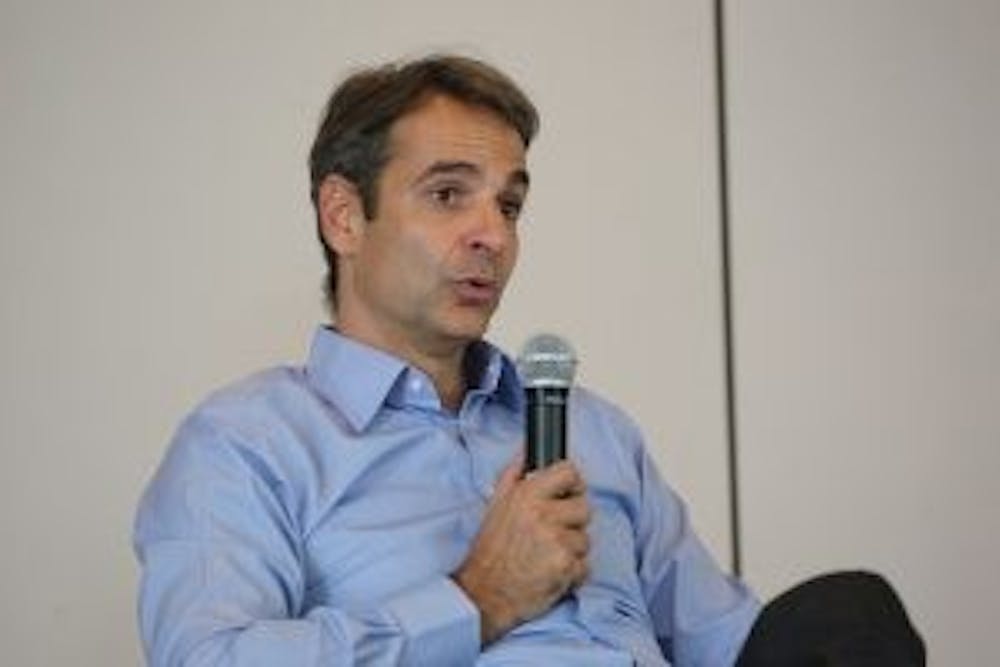Kyriakos Mitsotakis, leader of the political opposition in Greece, spoke on Friday about the country’s years-long debt crisis. Mitsotakis is the current president of the center-right New Democracy party, the second largest in parliament.
At the talk, “Greece at Crossroads: Challenges and Opportunities,” which was hosted by European Horizons, Mitsotakis explained his views on Greece’s current economic woes and how the country can make a sustainable economic recovery.
Mitsotakis described the impact the economic crisis has had on Greece, and criticized the governing Coalition of the Radical Left (Syriza) party for its management of the economy.
He related Greece’s current troubles to the ancient Greek myth of Sisyphus.
“Sisyphus was a figure condemned to constantly push a stone up a hill, only to see it fall down again and have to start again,” Mitsotakis said. “This was going on and on, in perpetuity. Sometimes, when I speak to my fellow Greek citizens, they have a sense of this never-ending ordeal.”
He outlined his take on the Greek economic crisis.
“Greece has lost, since the financial crisis, more than three-fifths of its GDP; A quarter of its economy has practically disappeared,” he said. “This is the biggest depression that any country has seen since the Second World War.”
Later in his speech, Mitsotakis discussed possible solutions for the crisis, stressing the need for a host of structural reforms for the Greek economy. He cited the importance of a more efficient public sector and privatization for the development of the economy.
“In a world that is very competitive, we need to be able to produce competitive products and services,” Mitsotakis said. “Nobody is going to be around to just lend you money. This fundamental transformation of the Greek economy is still the big challenge for Greece, and the only way to actually do it is to implement the reforms that are in the program. Once you do that, you will start regaining Greek economic independence. Unfortunately, that’s something which, under the current government, has not happened.”
Following his speech, Mitsotakis sat down for a discussion moderated by Associate Professor of Political Science Nicolas Jabko. He asked Mitsotakis to elaborate on issues he brought up in his speech, such as clientelism in Greek politics and the lack of trust Greek citizens have in their government.
Matthew Petti, a student at Columbia University, was surprised that Jabko pushed Mitsotakis on these issues.
“My favorite part was the part where [Professor] Jabko asked ‘why should we believe you?’ because it kind of told me this is not just a fluff event, this is a serious discussion and we’re going to get some serious answers out of this speaker,” Pettri said.
Students in the audience asked questions on topics ranging from tax evasion to losing educated young Greeks who are leaving the country. Sophomore Constanza Mayz, a member of European Horizons, discussed some of the highlights from the question and answer session.
“There was a really interesting question about the different parties and how that worked, and you just kind of learned a little more about Greece,” Mayz said. “Usually when you study European politics, you’re learning tidbits and little news flashes about everything. But when you actually talk to someone who leads the Opposition, you just understand a little more, like ‘Hey, this is really what’s going on here,’ and I didn’t think of that. It’s very interesting.”
Sophomore Lucas Feuser, the president of European Horizons, discussed why he believes the event was so valuable to the student body.
“Mitsotakis is an incredibly influential player in the Greek and European political scene and it was an honor to host him,” Feuser wrote in an email to The News-Letter. “We hoped for this event, as all events we host, to spark interest, and we were overjoyed to see that it did. We hope that students left with not only a better understanding of Greece’s situation, but also with the knowledge that there is an organization on campus founded to keep these events coming.”
When Mitsotakis was asked about how students and young people could help prevent further economic crises, he urged them to play a more active role in government.
“You are the next generation of leaders, and in my mind the quicker you become involved in politics the better it is,” Mitsotakis said. “And of course it’s very refreshing for us, the older generation, to talk to you because we really have to understand your priorities, your needs, your way of communicating, otherwise we’ll be missing out on the most dynamic part of our society.”

















